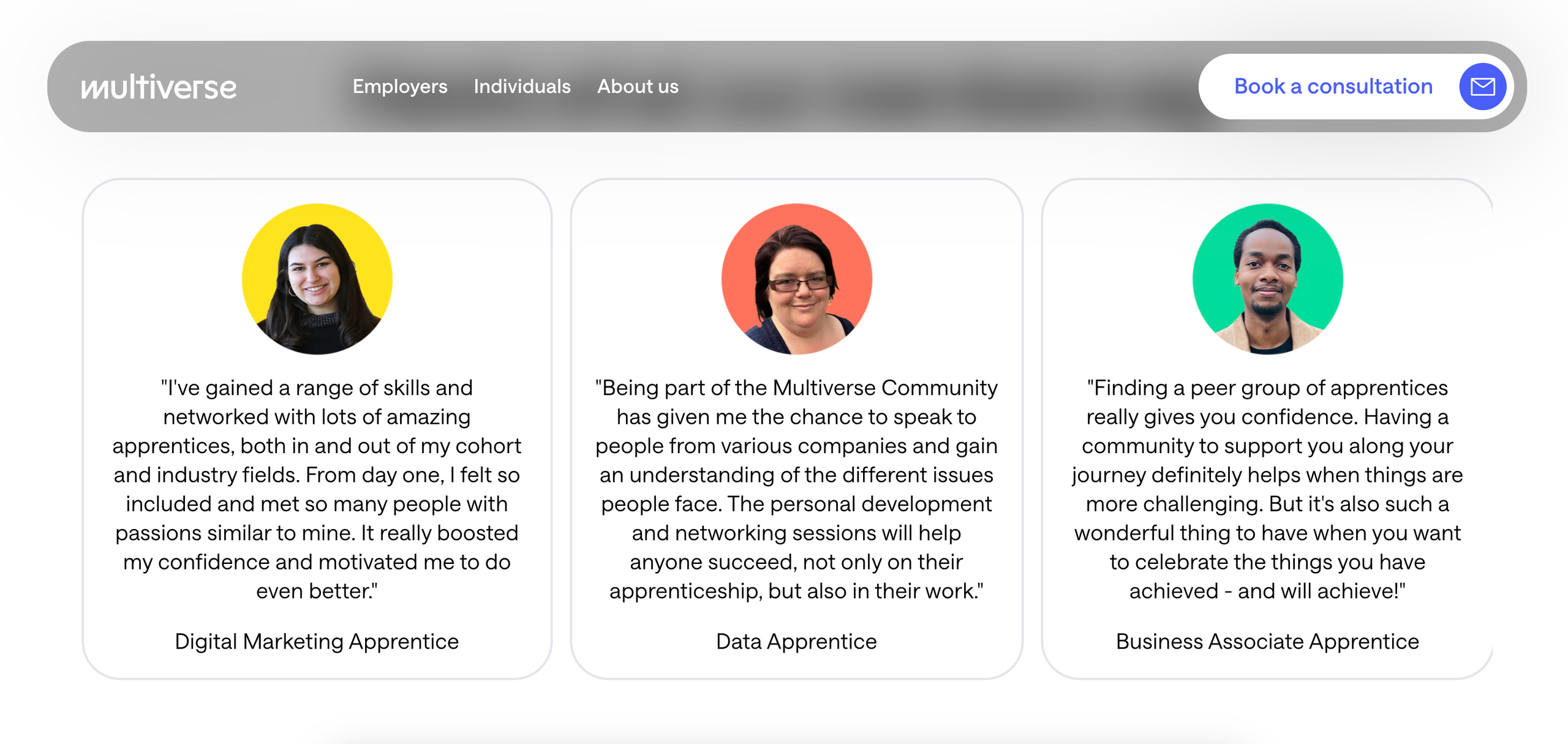Contents
Online learning (also known as e-learning) refers to any learning that takes place virtually. Many free training courses online are available 100% remotely, and you can complete them at a pace and time that suits you. However, depending on the specific training and your career goals, there might be a mixture of e-learning and on-the-job training.
Online learning is growing in popularity. Research by the Oxford Learning College found that 78.2% of e-learning students(opens new window) "would recommend e-learning to someone else." Meanwhile, the UK's online education market continues to grow at pace.
Not only is online learning rising in popularity, but it can also help you develop new tech job skills that are critical to career success. A recent Microsoft study revealed 82% of UK jobs already require digital skills(opens new window), and that 69% of leaders feel their organisation suffers from a digital skills gap.
To stay professionally competitive — now and in the future — upskilling or reskilling in durable tech skills through online training could be the solution.
The advantages of free online training
Why consider online training to build a more resilient career? In 2024, there are plenty of reasons to give online training a look — if you haven’t already. But we think these four reasons in particular are key.
Affordability
The first advantage is right there in the name: Free online training is affordable. Unlike paid-for online classes and boot camps, you don't need to self-fund the programme. You also don't need to quit your job to complete the course. So not only will you save money, but you'll continue to earn money as you improve your existing skills or learn new ones.
Flexibility
The second advantage is flexibility. Because your instructor will deliver the training (or share course materials) online, you can complete the learning around any existing commitments.
Variety
The third advantage is variety. When you choose to learn for free online, you can access various courses across multiple industries. From upskilling in tech to reskilling in business, an array of free training courses are available online.
Accessibility
The fourth advantage is accessibility. There's no cost barrier, no strict scheduling requirements, and you can complete the training from anywhere. Plus, there's likely a course available for your existing industry or an industry you'd like to enter. As a result, free online training is accessible by nature.
How to find the best free online courses
Here's how to search for and evaluate the best free online training courses:
Course content
You likely have a specific end goal in mind for your online training. So, the first thing you should assess is the course's content. Specifically, ask yourself, "Does this course cover the topics and skills I need to know to achieve my goals?"
Let's say your end goal is progressing from your current role as a Junior Data Analyst to a Senior Data Analyst. To achieve this, your Manager has recommended improving your artificial intelligence (AI) skills. In this case, you'll need to find online training with course content covering AI skills.
Instructor credentials
When evaluating the quality of a free online training course, take instructor credentials into account. To start, you'll want to learn from someone who is an expert in their field.
Depending on the course, you'll also need to learn from an instructor who has the right level of credentials to begin with. Otherwise, you might not be able to obtain an accredited qualification.
Certification
An accredited qualification might not be necessary if you want to take a short online training course to improve in a specific area. However, a formal qualification is sometimes required if you have a specific career goal. Some roles require a particular accreditation, for example. In that case, double-check that you'll earn any accredited qualifications you need to reach your goals.
Peer reviews
You can learn a lot about free online courses based on what people who've taken the training say about it. To find out what others say about their experiences—positive or negative — check course reviews and testimonials.

At Multiverse, we share learner testimonials and reviews throughout our website. You can see this in action on our AI for Business Value training course page. We also share learner success stories via our blog.
Top platforms offering free training courses
From Coursera to our own offerings here at Multiverse, we discuss some of the top platforms that provide free training courses online.
Coursera
Coursera is an online learning platform that offers training in many areas, from data science to arts and humanities. When it comes to free training, Coursera offers courses in tech. However, these options might not come with accredited and industry-recognised qualifications.
edX
edX offers free courses in a range of study areas, including the arts, science, and mindfulness training. Although you can view most edX courses for free, you must be a student registered in the paid verified track to gain a certificate of completion.
Udemy
Udemy offers free courses in multiple areas, including tech, personal growth and wellness. The free courses can range from 30 minutes to over four hours. Still, they're typically not as in-depth as Udemy's paid courses.
Khan Academy
Khan Academy provides free training in areas like maths, art, biology, and computer programming. The platform caters to various levels, from the Early Years Foundation Stage (EYFS) to Further Education (FE). Khan Academy also offers online "life skills" courses that apply to most people. That said, in the platform's own words:
"Khan Academy is not an accredited school, and work done on the site does not count towards a diploma or degree program. Khan Academy is best used as a supplement to your normal schooling..."
Multiverse
Multiverse provides high-quality apprenticeship programmes that combine work, training, and community. We focus on developing skills for the future, so our programmes cover the digital, tech and business industries. Courses cover various topics, from business operations to data science and software engineering.
Because we specialise in specific areas, we attract the best coaches and trainers who are experts in their field. All of our courses are tuition-free, so you can study at no cost to you. Upon completion, you'll also gain an industry-recognised and accredited qualification.
Key areas of learning available for free online
Let's break down some of the different categories of free training available online.
- Technology: You'll find courses in data analysis, machine learning (ML) and software engineering under the technology banner. However, you can also find short courses covering specific coding elements or even how to use certain software and tools.
- Business and entrepreneurship: Business and entrepreneurship are broad subject areas. That means you'll find a mixture of niche and more generalised courses. For example, at Multiverse, we offer a Technology Consulting programme combining business, entrepreneurship, and technology. However, there are also more generalised training courses available online. Some platforms offer training in general business skills (like communication and negotiation) and even how to start a business.
- Science: Biology, chemistry, and physics are all examples of science subjects. However, you can also find free online training in multidisciplinary fields like data science. Data science incorporates methods — including the scientific method — from different disciplines.
- Creative arts: Online training in the creative arts can cover anything from theoretical courses about Asian art and storytelling to more practical courses. Photography, digital painting, or pattern making are examples of more hand-ons courses in the creative arts.
- Humanities: The humanities typically include subjects related to human society and culture. (So the study of languages, literature, the arts, history, or philosophy.)
Tips for staying motivated and engaged
It's easy to feel demotivated when you see everything you need to do to get from A to B in its entirety. Instead, try breaking down your learning journey into manageable steps by setting learning goals. Simply put, these are specific, measurable milestones for your learning.
Setting yourself a deadline for completing assignments or learning specific theories are examples of learning goals. Depending on the course, your coach or instructor can help you structure your learning goals in line with your learning needs and the course itself.
Once you have your learning goals, creating a study schedule will help you complete them around your existing commitments. Even something simple in a spreadsheet, using your email calendar, or a physical weekly planner will help you plan, visualise and stick to your schedule.
Completing online training can sometimes feel isolating. When you feel isolated, it can impact your motivation, but participating in course forums can help. If your training provider has course forums or a learning community, you can speak to others who are completing the same course.
The Multiverse Community is an example of this in action. Through this powerful network of apprentices and alumni, members can inspire each other and learn new career skills as they progress through their training.
Success stories: Transformations through free online training
Back in March 2023, Multiverse apprentice Amy spoke with us about breaking into the media industry through an apprenticeship.
"I knew I didn't want to go to university so I did some research into my options after A Levels, and I came across companies like Channel 4, BBC and ITV who offered apprenticeships at varying levels and in multiple departments," says Amy.
Amy applied for and was accepted onto an apprenticeship through Multiverse working at Channel 4. Amy adds, "At Channel 4, I work in the Product Team to grow Channel 4's online streaming service, All 4." Through her apprenticeship Amy has experienced skill enhancements and opportunities that have shifted her career.
Pro tip: If choosing between an apprenticeship or a university route, try weighing the pros and cons. Career goals, interests and your preferred learning style are all factors to consider. That said, with UK university students paying up to £9,250 per year(opens new window) on tuition fees alone, the cost is a significant factor, too.
We spoke with Multiverse apprentice Jessica about how starting an apprenticeship was an easy decision. Before applying for a Multiverse apprenticeship, Jessica had already completed a Level 3 Digital Marketing apprenticeship and was looking for a Level 4 tech apprenticeship.
"I had heard of Multiverse back when I started looking for apprenticeships so I searched them up. I found so many apprenticeships, so many opportunities for so many different pathways. I came across the data analytics apprenticeship at Financial Times and had my eye set on it," says Jessica.
Jessica adds, "So far, my apprenticeship has been amazing. I have learned so much, both from my job and from Multiverse's events. I've been able to do things I didn't think I'd ever be able to do."
Pro tip: If, like Jessica, you've already completed an apprenticeship and want to explore progression routes, consider creating a Multiverse apprenticeship profile(opens new window). If you're eligible, a member of our team can then discuss apprenticeship levels and progression opportunities with you.
Certifications and recognitions: Do they matter?
Do nationally and industry-recognised certifications matter? Yes and no. It really depends on your goals.
For example, if you want to complete a short online course for personal reasons (like learning the basics of coding as a new hobby), certification doesn't matter so much. But if after completing your short course, you enjoy coding so much that you want to shift careers into the tech sector, then certification matters more.
For the latter, a tuition-free Data Fellowship apprenticeship with online training elements will help you enter the tech industry. Aside from hands-on work experience upon completion, you'll also gain a Level 4 apprenticeship standard in Data Analytics. An industry-recognised certification like this will help you stand out in future job searches and progress within your tech career.
But even certification gained from a short online course that took an hour of your time can demonstrate a specific skill level to your employer. At a very minimum, it shows that you want to advance your skill set.
Future trends in online learning
It's hard to predict the future, but it seems like the future's already here in many respects. According to Oxford Learning College(opens new window), "Almost half (49%) of e-learning students said that if an online course had a VR element, it would encourage them to sign up." It's no wonder then, that virtual reality (VR) and augmented reality (AR) courses are already on the horizon.
Microlearning, a less futuristic online learning trend but arguably more applicable to most learners, is also on the rise. Microlearning breaks down educational content into smaller, more digestible chunks. This bite-sized learning typically takes place in three—to five-minute intervals.
Given that research shows(opens new window) microlearning helps learners stay engaged, finish lessons faster, and increase knowledge retention, its growing popularity isn't surprising.
Aside from virtual reality (VR) courses and microlearning, the increasing credibility of online credentials is another rising trend. This increase is likely due to the fact that so much of our life and work takes place online now. So why should learning be any different? The advantages that we discussed earlier (flexibility, variety and accessibility) also help to improve the credibility of online training.
How to leverage free online training for career advancement
Maybe you want to advance in an existing career, or perhaps you'd like to pivot and start a new career entirely. Either way, the knowledge and skills gained from free online courses can help you achieve your goals. Let's explore each, starting with how to advance in an existing career through upskilling.
We'll return to an earlier example: You want to progress from Junior to Senior Data Analyst. Your Line Manager recommended improving your AI skills as a first step.
To demonstrate your commitment, you complete a short, free online AI training course. You then update your Line Manager, who recommends you for a tuition-free Advanced Data Fellowship programme. As a result of the training, you enhance your skill set and take on new responsibilities. Midway through the programme, your Line Manager promotes you from Junior to Senior Data Analyst.
Now, let's look at how to start a new career through reskilling. We'll return to another earlier example: After completing a short course in coding, you want to switch to a new career in tech.
First, you decide to update your CV to show that you completed a relevant short course. To do this, you add your new professional qualification to the education section of your resume. Next, you decide to update your LinkedIn profile by adding the new qualification to your 'Licenses & certifications(opens new window)' section.
Then, you decide to apply for a tech apprenticeship(opens new window). Because you've demonstrated a commitment to learning tech skills, you're accepted onto a Level 4 Data Fellowship working with a top employer.
Conclusion: the endless possibilities of free online training
83% of UK businesses(opens new window) say technology advancements have increased the need for new skills in the workforce. As a result, we cannot overstate the career value of completing high-quality free training courses online.
Whether you use the training to get a foot in the door of a new career path or to progress in an existing one, there's never been a better time to learn new tech skills. Contact us today to learn more.









